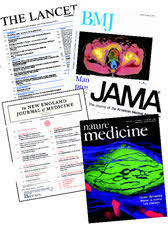February 18th, 2011 by GarySchwitzer in Health Policy, Opinion
No Comments »

This is a guest column by Ivan Oransky, M.D., who is executive editor of Reuters Health and blogs at Embargo Watch and Retraction Watch.
 One of the things that makes evaluating medical evidence difficult is knowing whether what’s being published actually reflects reality. Are the studies we read a good representation of scientific truth, or are they full of cherry-picked data that help sell drugs or skew policy decisions?
One of the things that makes evaluating medical evidence difficult is knowing whether what’s being published actually reflects reality. Are the studies we read a good representation of scientific truth, or are they full of cherry-picked data that help sell drugs or skew policy decisions?
That question may sound like that of a paranoiac, but rest assured, it’s not. Researchers have worried about a “positive publication bias” for decades. The idea is that studies showing an effect of a particular drug or procedure are more likely to be published. In 2008, for example, a group of researchers published a New England Journal of Medicine study showing that nearly all — or 94 percent — of published studies of antidepressants used by the FDA to make approval decisions had positive results. But the researchers found that when the FDA included unpublished studies, only about half — or 51 percent — were positive.
A PLoS Medicine study published that same year found similar results for studies long after drugs were approved: Less than half — 43 percent — of studies used by the FDA to approve 90 drugs were published within five years of approval. It was those with positive results that were more likely in journals.
All of that can leave the impression that something may work better than it really does. And there is at least one powerful incentive for journals to publish positive studies: Drug and device makers are much more likely to buy reprints of such reports. Such reprints are highly lucrative for journals. Read more »
*This blog post was originally published at Gary Schwitzer's HealthNewsReview Blog*
February 8th, 2011 by GarySchwitzer in News, Research
No Comments »

 Reuters Health reports that more than a quarter of Americans taking antidepressants have never been diagnosed with any of the conditions the drugs are typically used to treat, according to new research published in the Journal of Clinical Psychiatry. An excerpt:
Reuters Health reports that more than a quarter of Americans taking antidepressants have never been diagnosed with any of the conditions the drugs are typically used to treat, according to new research published in the Journal of Clinical Psychiatry. An excerpt:
“We cannot be sure that the risks and side effects of antidepressants are worth the benefit of taking them for people who do not meet criteria for major depression,” said Jina Pagura, a psychologist and currently a medical student at the University of Manitoba in Canada, who worked on the study.
“These individuals are likely approaching their physicians with concerns that may be related to depression, and could include symptoms like trouble sleeping, poor mood, difficulties in relationships, etc.,” she added in an e-mail to Reuters Health. “Although an antidepressant might help with these issues, the problems may also go away on their own with time, or might be more amenable to counseling or psychotherapy.”
*This blog post was originally published at Gary Schwitzer's HealthNewsReview Blog*
September 17th, 2010 by RyanDuBosar in Better Health Network, News, Research
No Comments »

Patients won’t confront doctors if they think there’s been a mistake. They’ll just find a new doctor, even if there’d been no medical error.
Researchers looked at adult visits to seven primary care practices in North Carolina during 2008. They asked patients about their perceptions of medical mistakes and how did it influence the choice to switch doctors.
Of 1,697 patients, 265 (15.6 percent) reported a mistake had been made, 227 (13.4 percent) reported a wrong diagnosis, 212 (12.5 percent) reported a wrong treatment, and 239 (14.1 percent) reported changing doctors as a result. Results appeared in the Archives of Internal Medicine.
But anecdotes cited by patients as mistakes were often normal diagnostic or therapeutic challenges. A typical scenario might be the patient reported symptoms, the doctor did not correctly diagnose it at first presentation, and a specialist or second physician offered a specific diagnosis. Other scenarios included medication trials or side effects from the prescription. Read more »
*This blog post was originally published at ACP Internist*
September 8th, 2010 by GarySchwitzer in Better Health Network, Health Policy, Health Tips, News, Opinion, Research
No Comments »

Journalist Andrew Holtz has been a colleague for longer than probably either one of us wants to remember. He is currently one of our story reviewers on HealthNewsReview.org. In fact, he was one of the reviewers on four stories we analyzed last week on the same study. He thought there were some important take-home messages that rose above the walls of our formal systematic review, so he wrote this guest blog post, and we thank him for it:
The Sept. 1 issue of the Journal of the American Medical Association included an article that is likely to have a strong influence on the advice given to women who have a very high risk of breast and ovarian cancer linked to mutations of the BRCA1 and BRCA2 genes. Of the four stories we reviewed, only the AP report scored well on our review criteria.
I know what my first journalism professor, Marion Lewenstein, would have done with at least two of the stories: Given them an “F” for factual errors without further consideration of their merits. Read more »
*This blog post was originally published at Gary Schwitzer's HealthNewsReview Blog*
August 21st, 2010 by JenniferKearneyStrouse in Better Health Network, Health Tips, News, Research
No Comments »

 A new study in the American Journal of Obstetrics & Gynecology reports that low levels of vitamin D may be linked to early-onset preeclampsia in pregnant women.
A new study in the American Journal of Obstetrics & Gynecology reports that low levels of vitamin D may be linked to early-onset preeclampsia in pregnant women.
The trial found that the average vitamin D level in 50 pregnant women with preeclampsia was 18 ng/mL, compared with 32 ng/mL in 100 women with healthy pregnancies. No casual relationship was proven, and the study’s lead author told Reuters Health that the recommended vitamin D intake in pregnant women hasn’t changed, but the study results raise yet more questions about this much-discussed nutrient.
ACP Internist covered the pros and cons of vitamin D in its November 2009 issue. (Reuters, ACP Internist)
*This blog post was originally published at ACP Internist*
One of the things that makes evaluating medical evidence difficult is knowing whether what’s being published actually reflects reality. Are the studies we read a good representation of scientific truth, or are they full of cherry-picked data that help sell drugs or skew policy decisions?




 A new study in the American Journal of Obstetrics & Gynecology reports that low levels of vitamin D may be linked to early-onset preeclampsia in pregnant women.
A new study in the American Journal of Obstetrics & Gynecology reports that low levels of vitamin D may be linked to early-onset preeclampsia in pregnant women.







